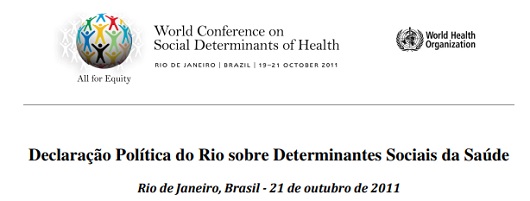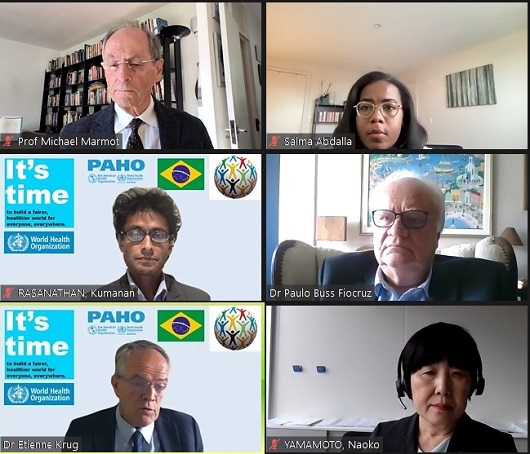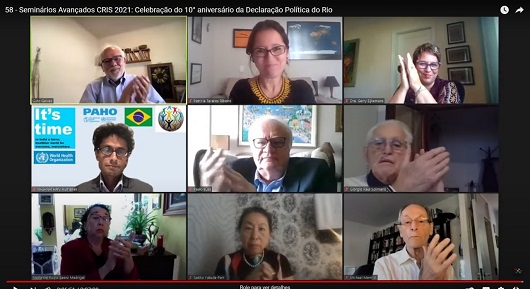Ten years later, the Rio Declaration on Social Determinants of Health is more contemporary than ever, say webinars
03/11/2021
Ciro Oiticica and Cristina Azevedo (Fiocruz New Agency)
Ten years after its signing, the Rio Political Declaration on Social Determinants of Health is more relevant than ever, as shown by the impacts of the COVID-19 pandemic in the world. To celebrate the document’s tenth anniversary and evaluate the approaches adopted since, two webinars held last Thursday (21 October) brought together many actors that were crucial for the negotiations that culminated in the declaration and for the quest for its implementation. While the World Health Organization (WHO) organized the seminar Actions on the Social Determinants of Health Equity, opened by the organization’s Director-General, Tedros Adhanom Ghebreyesus, the Fiocruz Global Health Center (CRIS/Fiocruz) brought in its advanced seminars, Social Determinants of Health - Celebration of the 10th Anniversary of the Rio Political Declaration, with the participation of Nísia Trindade Lima.
“COVID-19 showed we can only improve the health of the world’s population if we address the inequalities that put it at grave risks. This is exactly what the Rio Declaration requested ten years ago”, said Ghebreyesus at the WHO seminar, thanking Brazil for having hosted the conference in 2011.
At the opening of the Cris/Fiocruz event, Lima highlighted that “the strength of the thesis of social determinants of health has never been felt more”, in a reference to the social selectivity with which the disease hit different populations. “The pandemic goes way beyond the public health crisis, and it has put before us challenges that include rethinking our way of life, of production, and forms of sociability all over the planet, as well as the relation between humans and nature”, she concluded. Mentioning the meeting that took place ten years ago, she said she hoped “we can fiercely resume that spirit in today’s celebration”.
At the WHO seminar, a trip to memory lane with an eye in the future
On October 21st, 2011, the World Conference on the Social Determinants of Health brought together representatives of 120 countries at the Copacabana Fort. At its end, a document was produced in which chiefs of State and other government representatives committed to adopting concrete actions to ensure equity in health and to provide the population with access to services, medicines, and other goods that are essential for life. Ten years later, inequalities were observed in the access to treatments and vaccines. For this reason, the WHO Director-General highlighted the need to renew this determination to address poverty, discrimination, and other inequities that trigger or worsen sanitary crises, such as this pandemic.
Describing the Rio Declaration as a milestone, Health Minister Marcelo Queiroga highlighted in both seminars the role played by the Brazilian Unified Health System (SUS) in providing access to treatment, medicines and vaccines. “The pandemic has brought additional challenges to our socities and has shed light on the need to make our health systems stronger and more inclusive, with a special focus on primary healthcare”, he said.
To talk about the Rio Declaration, we must go back in time. In 2008, Michael Marmot, then president of the WHO Committee on Social Determinants of Health, delivered to the organization a report on the subject. During the webinars, he said he was surprised in 2011 when he saw the Organization was discussing the realization of a world conference on the subject, and Paulo Buss, then the Brazilian representative in the WHO’s Executive Committee, offering to have Brazil host it. “Wow, we’re on the agenda, I thought”, said Marmot. Director of Institute of Health Equity from University College London, draws “a line before and after the Rio Declaration”, with the creation of regional WHO commissions for the SDH, discussions on the subject and actions adopted by countries such as the United Kingdom.
Buss, now director of CRIS/Fiocruz, said the despite the many ups and downs, the SDH have remained in the debates since then, because “there is a common sense that health is not the exclusive result of the development of genetic potential or of human biology. It is practically universally accepted that economic and social conditions are very important for health”, he said.
Naoko Yamamoto, assistant general-director for the WHO’s Healthier Populations, and Carissa Etienne, director of the Pan-American Health Organization (PAHO), emphasized at the WHO seminar the consequences of the declaration, working as a guide for actions all over the world. The influence of the document was felt at Rio+20, in 2012, with the declaration against poverty, and during the drawing up of the 2030 Agenda, with its 17 Sustainable Development Goals (SDGs), in 2015.
But participants agree there is much to be done. “The next ten years will be crucial for the recovery and reconstruction after the pandemic. We can only accomplish this by approaching the SDH with government, with the society and with partners joining forces in this action”, says Carissa Etienne. Helen Clark, co-president of the Independent Panel and former New Zealand prime minister, declared that “the past year of the pandemic has shown us the cost of inaction regarding the SDH". Salma Abdalla, researcher of the Boston University, highlighted the need to have data to address the SDH, while Etienne Krug, director of the WHO/SDH Department, said the discussion is increasingly more necessary.
CRIS seminar: from global to regional
Mediated by Luiz Augusto Galvão, senior researcher of CRIS/Fiocruz, the Foundation’s seminar focused more on Brazil and Latin America. He brought back some of the participants that had attended the WHO event earlier, such as minister Queiroga, Carissa Etienne, Michael Marmot, and Paulo Buss.
Nísia Trindade Lima welcomed the participants, expressing emotion as she reminisced on the World Conference on the Social Determinants of Health, which originated the declaration, “at the Copacabana Fort, where we discussed, with representatives of the entire world, the essential steps that must be taken to acknowledge the social determinants of health (SDH)”. Lima used her presence at Fiocruz Amazônia as a chance to rekindle solidarity with the population of the region, where the pandemic hit dramatic levels, she said.
Marmot, on his turn, complimented Brazilian actions before and during the conference. He mentioned that the country launched its own National Committee for SDH in 2006 and became a “champion for action” regarding them, after the report of the Global Commission, in 2010, which put it in the position of the main candidate to host the World Conference. “Do something, do more, do better”, he asked administrators and mentioning the different initiatives of the WHO’s regional commissions, which discuss various subjects such as structural racism and colonialism, migration, refugees, tax evasion, and gender violence. “Governments come and go, the wheels of the world turn and turn, but we always move forward, little by little”, he assured.
The national context that led Brazil to a position of protagonist in the elaboration of the Rio Declaration was described by Patrícia Ribeiro, coordinator of the Center for Studies, Policies and Information on SDH (Cepi-DSS/ENSP). She presented the history of SDH addressing, the juridical establishment of the SUS in the Brazilian Constitution, and income transfer policies. “Do we have reasons to celebrate?”, she asked. “I believe so. It’s not easy to add to the agenda an issue that requires such a complex cultural change in the scenario of public policies and government management, in contexts marked by political and economic instability, as we have seen in the past 10 years, plus national and international uncertainties and challenges. “And yet, here we are”, she said, “although today we are possibly further away from the path of equity than we were ten years ago”.
Some civil society organizations, which have been pushing for the implementation of policies that take SDH into account, were introduced. Rócio Sanz, former minister of health of Costa Rica, explained the actions of the Health Equity Network of the Americas (HENA), of which she is director, and that offers analytical and intervention in health models developed from various points of view, such as social medicine and human ecology. Sakiko Fukuda-Parr, on the other hand, is a representative of the SDH Collective, a research group that highlights the political determinants of health: “The obstructionism of powerful actors that prevent change, and the enormous disparities of power between actors are at the root of inequalities in health”. Giorgio Solimano represented the Latin-American Alliance of Academic Institutions in Global Health, consisting of 11 universities and public health programs in the entire region and that holds congresses every two years to direct the elaboration of public policies.
The conclusions of the meeting were in charge of Gerry Ejikemans, chief of the Unit of Promotion of Health and Social Determinants of Health of the PAHO, and Kumanan Rasanathan, chief of the WHO’s Unit of Equity and Health, who had mediated the organization’s seminar earlier. Ejikmans stated that this is the time to celebrate and to look ahead. The pandemic has shed light on the urgent need to improve fragile health systems, the cause of so much suffering. “The regions that are the most unequal are those that suffered the most”, she added. He also defended a policy for the future that can recover SDGs by means of SDHs. She said that by September 2022, the PAHO Council of Ministers intends to formulate a declaration with prognosis and means to recover the 2030 Agenda.
Kumanan Rasanathan also made a call to action: “This is a moment of crisis, but it’s in this moment that we must act.” He said the WHO is ready to support the countries and this great motion of promotion of equity, and revealed that the organization is developing a new global report to be launched by the end of 2022, to reflect on the period after the World Conference and the Declaration. “Why didn’t we get where we wanted to get? Why has the pandemic revealed so much inequality?”, he pondered. He also projected scenarios in an analogy with the last pandemic to take over the planed, the 1918 flu: “Will we have an effervescent decade such as that of 1920, or will we go through a Great Depression?” More than focusing on hypothesis, he said, one must trust in action.




